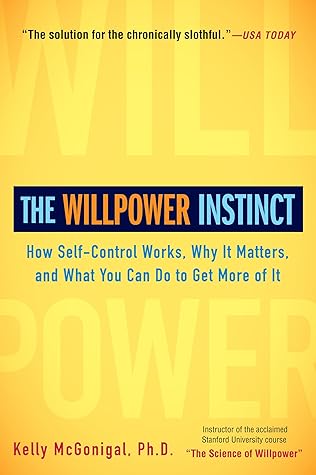More on this book
Community
Kindle Notes & Highlights
Read between
April 10 - August 8, 2019
For change to stick, we need to identify with the goal itself, not the halo glow we get from being good.
The Idea: When we turn willpower challenges into measures of moral worth, being good gives us permission to be bad. For better self-control, forget virtue, and focus on goals and values.
To revoke your license, remember the why. The next time you find yourself using past good behavior to justify indulging, pause and think about why you were “good,” not whether you deserve a reward.
This week, pay attention to what captures your attention. What unleashes that promise of reward that compels you to seek satisfaction? What gets you salivating like Pavlov’s dogs or obsessed like Olds and Milner’s rats?
When dopamine is released by one promise of reward, it also makes you more susceptible to any other kind of temptation.
Make it a game when you go to the grocery store or watch advertisements. What do you smell? What do you see? What do you hear? Knowing that cues have been carefully chosen to tempt you can help you see them for what they are and resist them.
Since it’s unlikely we’ll ever outlaw the promise of reward, we might as well put it to good use.
We can take a lesson from neuromarketers and try to “dopaminize” our least favorite tasks.
One of the most effective intervention strategies in alcohol and drug recovery is something called the fish bowl.
About half of these slips have a prize listed on them, ranging in value from $1 to $20. Only one slip has a big prize, worth $100. Half of the slips have no prize value at all—instead, they say, “Keep up the good work.”
DOPAMINIZE YOUR “I WILL” POWER CHALLENGE
If there’s something you’ve been putting off because it’s so unpleasant, can you motivate yourself by linking it to something that gets your dopamine neurons firing?
This week, see if you can notice when wanting triggers stress and anxiety. If you give in to temptation, do you feel like you are responding to the promise of reward? Or are you trying to relieve the anxiety?
We mistake the experience of wanting for a guarantee of happiness.
If you force your brain to reconcile what it expects from a reward—happiness, bliss, satisfaction, an end to sadness or stress—with what it actually experiences, your brain will eventually adjust its expectations.
However, the research shows that people who practice this mindful-eating exercise develop greater self-control around food and have fewer episodes of binge-eating.
When we free ourselves from the false promise of reward, we often find that the thing we were seeking happiness from was the main source of our misery.
This is a little-known effect of diet soda that contributes to hunger, overeating, and weight gain. The sweet taste tricks the body into taking up glucose from the bloodstream in anticipation of a blood sugar spike. You’re left with less energy and less self-control, while your body and brain wonder what happened to the sugar rush they were promised. This may be why recent studies show that diet soda consumption is associated with weight gain, not weight loss.


